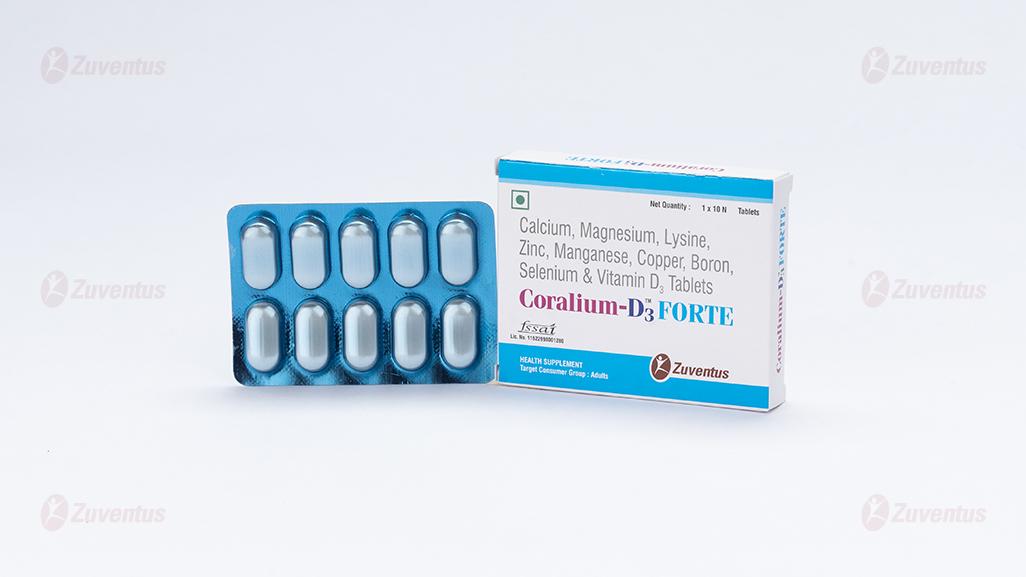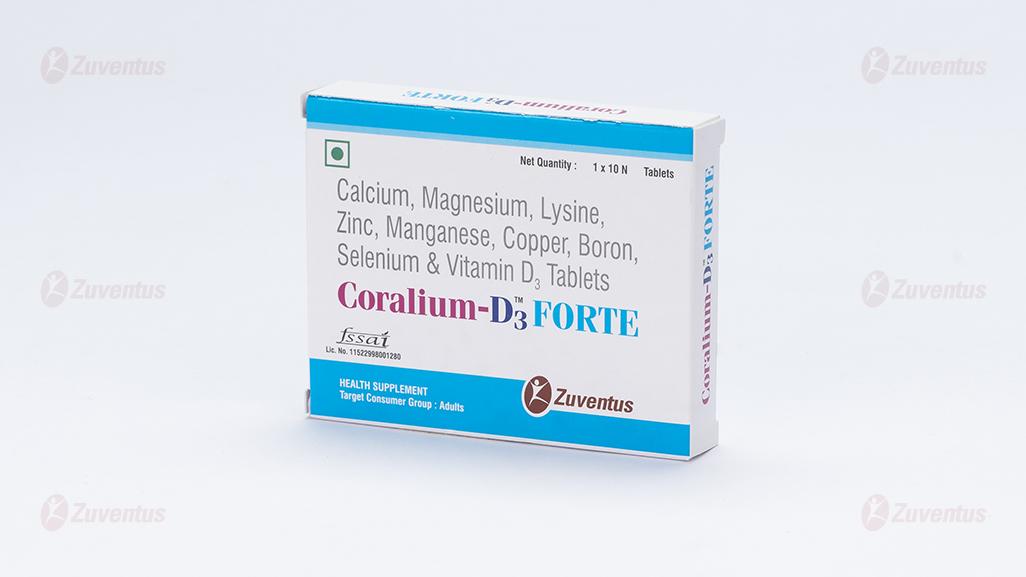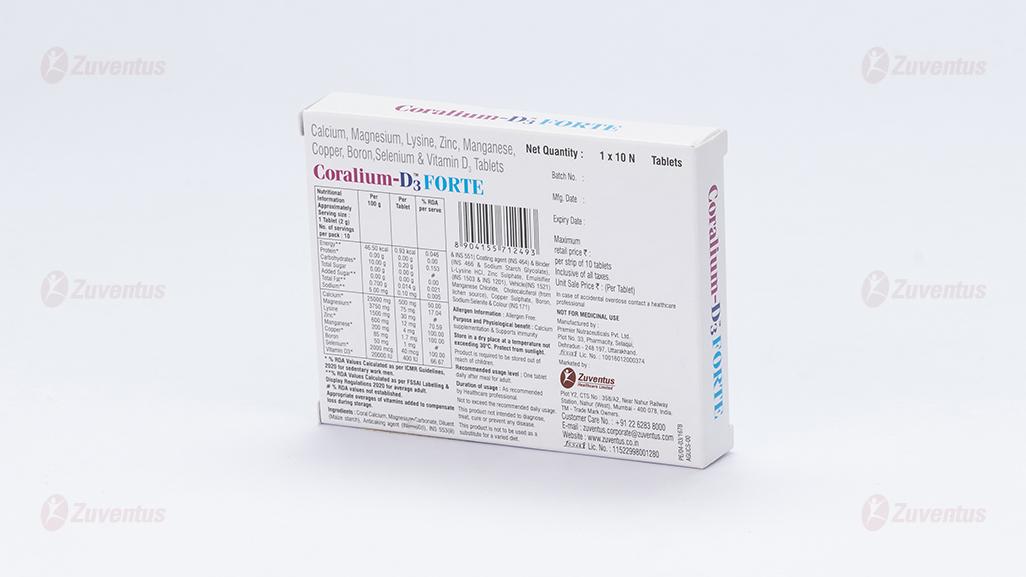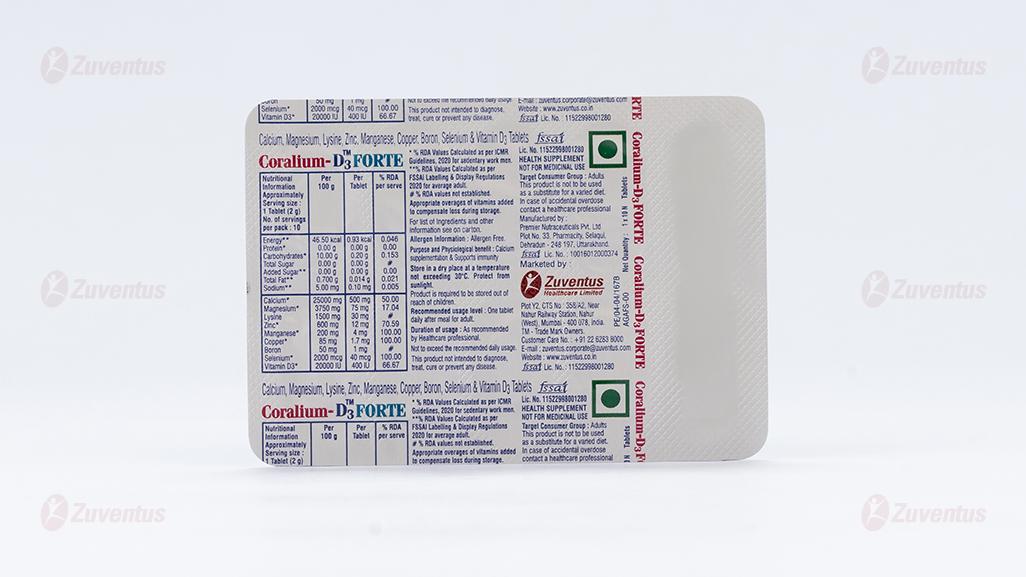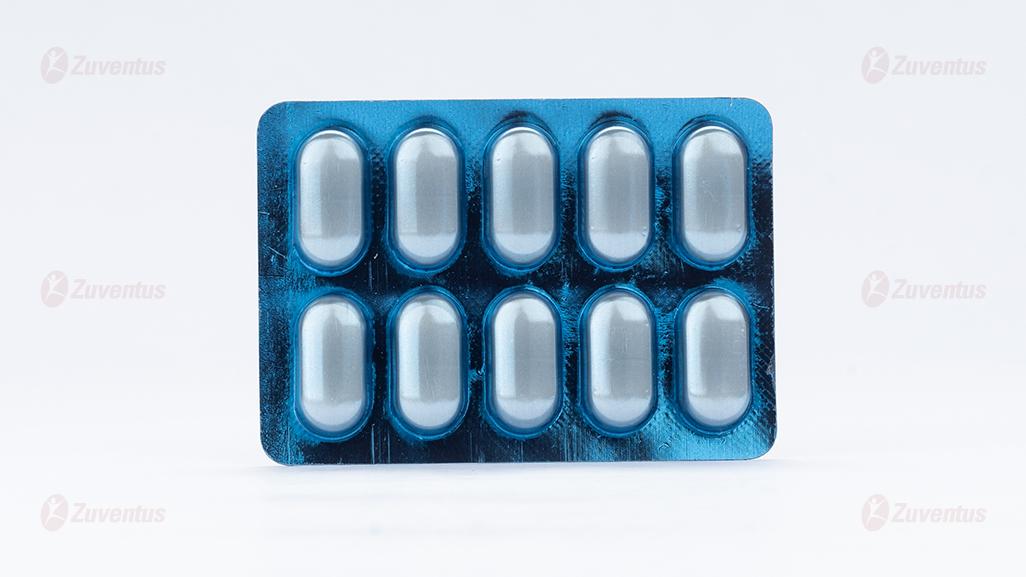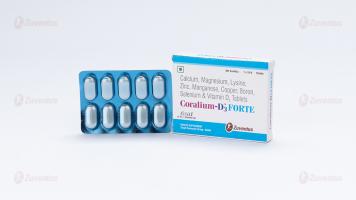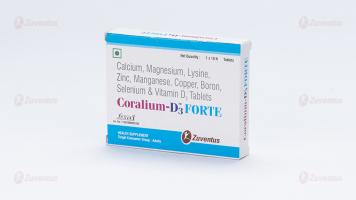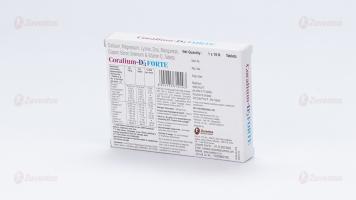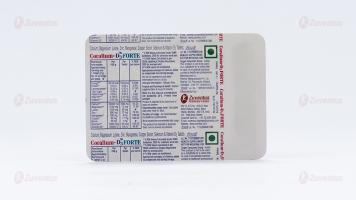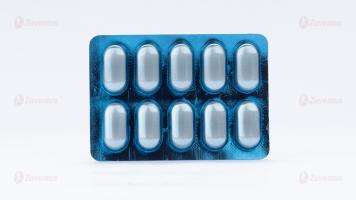Coralium D3 Forte Tablets
Therapy Area
Vitamins/Minerals Supplements
1.0 Generic name
Calcium, Magnesium, Lysine, Zinc, Manganese, Copper, Boron, Selenium & Vitamin D3 Tablets
2.0 Qualitative and quantitative composition
Each tablet contains:
Coral calcium (elemental Calcium) …….............500mg
Magnesium (elemental)……..................................75mg
As Magnesium carbonate
L-Lysine HCL............…………….........................30mg
Zinc (elemental)………...………………………...12mg
As zinc sulphate
Manganese (elemental)………………………….....4mg
As Manganese chloride
Copper (elemental)…………..................................1.7mg
As copper sulphate
Boron………………………………..........................1mg
Selenium (elemental)……………………………..40mcg
As Sodium selenite
Vitamin D3……......................................................400IU
(from lichen source)
3.0 Dosage form and strength
Tablet.
Calcium 500mg, Magnesium 75mg, Lysine 30mg, Zinc 12mg, Manganese 4mg, Copper 1.7mg, Boron 1mg, Selenium 40mcg, Vitamin D3 400IU
4.0 Clinical particulars
4.1 Therapeutic Indication
Calcium supplementation & Supports immunity
4.2 Posology and Method of Administration
One tablet daily after meal for adult
4.3 Contraindications
- Hypersensitivity to the active substance or to any of the excipients listed in the formulation.
- Diseases and/or conditions resulting in hypercalcemia and/or hypercalciuria (e.g. myeloma, bone metastases or other malignant bone disease, sarcoidosis; primary hyperparathyroidism).
- Nephrolithiasis/nephrocalcinosis
- Severe renal impairment and renal failure
- Hypervitaminosis D
- Hypersensitivity to the active substances or to any of the excipients present in this tablet.
- Relative contra-indications are osteoporosis due to prolonged immobilization, renal stones, and severe hypercalciuria.
4.4 Special warnings and precautions for use
- Patients who are already taking thiazide diuretics and/or cardiac glycosides should be referred to their doctor prior to concomitant use (i.e. not suitable for pharmacy supply). Concomitant use should be prescribed with caution due to the increased risk of hypercalcemia.
- During long-term treatment, serum calcium levels should be followed and renal function should be monitored through measurements of serum creatinine. Monitoring is especially important in elderly patients on concomitant treatment with cardiac glycosides or diuretics and in patients with a high tendency to calculus formation. In case of hypercalcemia or signs of impaired renal function, the dose should be reduced or the treatment discontinued. It is advisable to reduce or interrupt treatment temporarily if urinary calcium exceeds 7.5 mmol/24 h (300 mg/24 h).
- Vitamin D should be used with caution in patients with impairment of renal function and the effect on calcium and phosphate levels should be monitored. The risk of soft tissue calcification should be taken into account. In patients with severe renal insufficiency, vitamin D in the form of cholecalciferol is not metabolized normally and other forms of vitamin D should be used.
- Coralium-D3 forte tablets should be prescribed with caution to patients suffering from sarcoidosis, due to the risk of increased metabolism of vitamin D into its active form. These patients should be monitored with regard to the calcium content in serum and urine.
- Coralium-D3 forte tablets should be used with caution in immobilized patients with osteoporosis due to the increased risk of hypercalcemia.
- The content of vitamin D (500 IU) in Coralium-D3 forte tablets should be considered when prescribing other medicinal products containing vitamin D. Additional doses of calcium or vitamin D should be taken under close medical supervision. In such cases, it is necessary to monitor serum calcium levels and urinary calcium excretion frequently. Milk-alkali syndrome (Burnett's syndrome), i.e. hypercalcemia, alkalosis, and renal impairment can develop when large amounts of calcium are ingested with absorbable alkali.
- Allowances should be made for calcium and vitamin D supplements from other sources.
- Whilst taking Coralium-D3 forte tablets, both protein and energy are also required to provide complete nutrition in the daily diet. No other vitamins, minerals or supplements with or without vitamin A should be taken with this preparation except under medical supervision.
- Do not take Coralium-D3 forte tablets on an empty stomach. Do not exceed the stated dose. Keep out of the reach of children. If symptoms persist, consult your doctor.
4.5 Drugs interactions
- Thiazide diuretics reduce the urinary excretion of calcium. Due to the increased risk of hypercalcemia, serum calcium should be regularly monitored during the concomitant use of thiazide diuretics.
- Systemic corticosteroids reduce calcium absorption. During concomitant use, it may be necessary to increase the dose of Coralium D3 forte tablets.
- Simultaneous treatment with ion exchange resins such as cholestyramine or laxatives such as paraffin oil may reduce the gastrointestinal absorption of vitamin D.
- Calcium carbonate may interfere with the absorption of concomitantly administered tetracycline preparations. For this reason, tetracycline preparations should be administered at least two hours before or four to six hours after oral intake of calcium.
- Hypercalcaemia may increase the toxicity of cardiac glycosides during treatment with calcium and vitamin D. Patients should be monitored with regard to electrocardiogram (ECG) and serum calcium levels.
- If a bisphosphonate or sodium fluoride is used concomitantly with Coralium D3 forte tablets, these medicinal products should be administered at least three hours before the intake of Coralium D3 forte tablet since gastrointestinal absorption may be reduced.
- Rifampicin, phenytoin, or barbiturates may reduce the activity of vitamin D3, since they increase the rate of its metabolism.
- The absorption of quinolone antibiotics may be impaired if administered concomitantly with calcium. Quinolone antibiotics should be taken two hours before or six hours after intake of calcium.
- Calcium salts may decrease the absorption of iron, zinc or strontium. Consequently, the iron, zinc or strontium preparation should be taken at a distance of two hours from the calcium preparation.
- Calcium salts may reduce the absorption of the estramustin or thyroid hormones. It is recommended that taking CoraliumD3 forte tablets be spaced at least 2 hours from these medicines.
- Oxalic acid (found in spinach, sorrel and rhubarb), phosphate, and phytic acid (found in whole cereals) may inhibit calcium absorption through the formation of insoluble compounds with calcium ions. The patient should not take calcium products within two hours of eating foods high in oxalic acid and phytic acid.
- Zinc Sulphate reduce the absorption of tetracyclines
4.6 Use in special populations
Pregnancy
Coralium-D3 forte tablets may be given during pregnancy in cases of calcium and vitamin D3 deficiency.
During pregnancy the daily dose should not exceed 1500 mg of calcium and 600 IU of vitamin D. Animal studies have shown toxic effects on reproduction at high doses of vitamin D. In pregnant women, all calcium or vitamin D overdose must be avoided as prolonged hypercalcemia in pregnancy may lead to retardation of physical and mental development, supravalvular aortic stenosis and retinopathy in the child. There are no indications that Vitamin D3 at therapeutic doses is teratogenic in humans.
Breast-feeding
Coralium-D3 forte tablets can be used during breast-feeding. Calcium and vitamin D pass into breast milk. This should be considered when giving additional vitamin D to the child.
Coralium-D3 forte tablets may be administered during pregnancy and lactation at the recommendation of the physician.
4.7 Effects on ability to drive and use machines
There are no data on the effect of this product on driving capacity and use of machines. An effect is, however, unlikely.
4.8 Undesirable effects
Adverse reactions are listed below, by system organ class and frequency. Frequencies are defined as: uncommon (>1/1,000 to <1/100); rare (>1/10,000 to <1/1,000); very rare (<1/10,000); not known (cannot be estimated from the available data).
- Immune system disorders
- Not known: Hypersensitivity reactions including pruritus, wheezing, urticaria, and oropharyngeal swelling have been reported in the post-marketing environment.
- Metabolism and nutrition disorders
- Uncommon: Hypercalcaemia and hypercalciuria.
- Very rare: Seen usually only in overdose, see 4.9: Milk-alkali syndrome
- Gastrointestinal disorders
- Rare: Constipation, flatulence, nausea, vomiting, abdominal pain, and diarrhea.
- Very rare: Dyspepsia
- Skin and subcutaneous disorders
- Rare: Pruritus, rash and urticaria.
- Other special population
- Patients with renal impairment: potential risk of hyperphosphatemia, nephrolithiasis, and nephrocalcinosis.
Reporting of suspected adverse reactions
Reporting suspected adverse reactions after authorisation of the medicinal product is important. It allows continued monitoring of the benefit/risk balance of the medicinal product. Healthcare professionals are asked to report any suspected adverse reactions via email to: medico@zuventus.com
Website: https://www.zuventus.com/drug-safety-reporting
4.9 Overdose
No cases of overdosage due to Calcium-D3 forte therapy have been reported.
If overdose of calcium and vitamin-D3 suspected can lead to hypervitaminosis and hypercalcemia. Symptoms of hypercalcemia may include anorexia, thirst, nausea, vomiting, constipation, abdominal pain, muscle weakness, fatigue, mental disturbances, polydipsia, polyuria, bone pain, nephrocalcinosis, renal calculi, and in severe cases, cardiac arrhythmias. Extreme hypercalcemia may result in coma and death. Persistently high calcium levels may lead to irreversible renal damage and soft tissue calcification.
Milk-alkali syndrome may occur in patients who ingest large amounts of calcium and absorbable alkali. Symptoms are frequent urge to urinate, continuing headache, continuing loss of appetite, nausea or vomiting, unusual tiredness or weakness, hypercalcemia, alkalosis, and renal impairment.
Treatment of Calcium-D3 forte Overdosage
The following steps are recommended to minimise or prevent further absorption of the medication:
- Administer an emetic.
- Gastric lavage may be necessary to remove drug already released into the stomach. Keep the patient under constant surveillance to detect possible aspiration of vomitus; maintain suction apparatus and standby emergency oxygen in case of need.
- A drink of mannitol or sorbitol should be given to induce small bowel emptying.
- Any fluid or electrolyte imbalance should be corrected.
Treatment of hypercalcemia
The treatment with calcium and vitamin D must be discontinued. Treatment with thiazide diuretics, lithium, vitamin A, vitamin D, and cardiac glycosides must also be discontinued. Emptying of the stomach in patients with impaired consciousness. Rehydration, and, according to severity, isolated or combined treatment with loop diuretics, bisphosphonates, calcitonin, and corticosteroids. Serum electrolytes, renal function, and diuresis must be monitored. In severe cases, ECG and CVP should be followed.
5.0 Pharmacological properties
5.1 Pharmacodynamic properties/ Mechanism of Action
Calcium, combination with vitamin D3
Calcium is an essential body electrolyte. It is involved in the maintenance of normal muscle and nerve function and essential for normal cardiac function and the clotting of blood. Calcium is mainly found in the bones and teeth. Deficiency of calcium leads to rickets, osteomalacia in children and osteoporosis in the elderly.
Vitamin D increases the intestinal absorption of calcium. Administration of calcium and vitamin D3 (cholecalciferol) counteracts the increase of parathyroid hormone (PTH), which is caused by calcium deficiency and causes increased bone resorption.
Magnesium Magnesium is essential to the body as a constituent of skeletal structures and in maintaining cell integrity and fluid balance. It is utilised in many of the functions in which calcium is concerned but often exerts the opposite effect. Some enzymes require the magnesium ion as a co-factor.
Lysine
Lysine is an essential amino acid that is primarily used for protein synthesis. Lysine helps in synthesis of connective tissues such as bone, skin, collagen, and elastin; synthesis of carnitine and resultant conversion of fatty acids to energy; support for healthy growth and development in children; and maintenance of healthy immune function. Lysine has been shown to increase iron absorption in vivo.
Zinc
Zinc is an essential trace mineral necessary for the proper function of about 300 different enzymes. Zinc is important for wound healing, immune system support, digestion, energy production, growth, cellular repair, collagen synthesis, bone strength, cognitive function, and carbohydrate metabolism (glucose utilization and insulin production). Zinc not only modulates cell-mediated immunity but is also an antioxidant and anti-inflammatory agent.
Manganese
Manganese is an essential element for humans and is required for growth, development, and maintenance of health. Manganese is necessary for skeletal system development, energy metabolism and immunological system function. It is an antioxidant that protects cells from damage due to free radicals. Manganese also plays an essential role in regulation of cellular energy, bone and connective tissue growth and blood clotting.
Copper
Traces of copper are essential to the body as constituents of enzyme systems involved in oxidation reactions.
Boron
Boron is a trace element which might have beneficial effects on functions such as reproduction and development, calcium metabolism, bone formation, brain function, insulin and energy substrate metabolism, immunity, and the function of steroid hormones (including vitamin D and estrogen).
Selenium
Selenium is an essential trace element, deficiency of which has been reported in man. It is thought to be involved in the functioning of membranes and the synthesis of amino acids. Deficiency of selenium in the diet of experimental animals produces fatty liver followed by necrosis.
5.2 Pharmacokinetic properties
Calcium
Absorption:
The bioavailability of coral calcium is approximately 70% as per study in animals by Japanese Dietetic Society. This is higher as compared to other calcium salts. Unlike lime and fossilized calcium which are inert, live coral produces calcium in its ionized form. This calcium is able to bypass the digestive process. Hence, calcium and other trace minerals from coral are immediately available to the systems in the human body.
Distribution and metabolism:
99% of the calcium in the body is concentrated in the hard structure of bones and teeth. The remaining 1% is present in the intra- and extracellular fluids. About 50% of the total blood-calcium content is in the physiologically active ionized form with approximately 10% being complexed to citrate, phosphate, or other anions, the remaining 40% being bound to proteins, principally albumin.
Elimination:
Calcium is eliminated through feces, urine, and sweat. Renal excretion depends on glomerular filtration and calcium tubular reabsorption.
Vitamin D
Absorption:
Vitamin D3 is absorbed in the small intestine.
Distribution and metabolism:
Cholecalciferol and its metabolites circulate in the blood bound to a specific globulin. Cholecalciferol is converted in the liver by hydroxylation to the active form 25-hydroxy cholecalciferol. It is then further converted in the kidneys to 1,25hydroxycolecalciferol. 1,25 hydroxy cholecalciferol is the metabolite responsible for increasing calcium absorption. Vitamin D which is not metabolized is stored in adipose and muscle tissues.
Elimination:
Vitamin D is excreted in feces and urine.
Magnesium
Magnesium salts are poorly absorbed from the gastro-intestinal tract; however, sufficient magnesium will normally be absorbed to replace deficiency states. Magnesium is excreted in both the urine and the faeces but excretion is reduced in deficiency states.
Lysine
Lysine absorbed from the lumen of the small intestine into the enterocytes by an active transport process.
Zinc Sulphate
Zinc is poorly absorbed from the gastro-intestinal tract. It is widely distributed throughout the body. It is excreted in the faeces with traces appearing in the urine.
Manganese Sulphate
Manganese salts are poorly absorbed
Copper
Copper is absorbed from the gastro-intestinal tract and its major route of excretion is in the bile.
Boron
Most ingested boron is hydrolyzed to boric acid within the gastrointestinal tract. The body absorbs about 85%–90% of ingested boron. However, very little is known about how or where in the gastrointestinal tract absorption occurs.
Selenium
Although it has been established that selenium is essential to human life, very little information is available on its function and metabolism.
6.0 Nonclinical properties
6.1 Animal Toxicology or Pharmacology
At doses far higher than the human therapeutic range teratogenicity has been observed in animal studies. There are further no pre-clinical data of relevance to the prescriber which are additional to that already included in other sections of the prescribing information.
7.0 Description
Coralium D3 forte tablets contain a comprehensive formula of calcium and vitamin D3 with multi-minerals and anti-oxidant specially designed to support health and wellbeing in adults by unlocking energy and strengthening immunity. Most vitamins, minerals and trace elements are not produced by human body and hence are dependent on dietary supply of these nutrients. Since vitamins, minerals and trace elements are involved in many metabolic processes in the body, an adequate supply of these vital substances contribute to physical and mental well-being.
8.0 Pharmaceutical particulars
8.1 Incompatibilities
Not applicable.
8.2 Shelf-life
Refer on the pack
8.3 Packaging information
10 tablets per pack
8.4 Storage and handing instructions
Store in a dry place at a temperature not exceeding 30°C, protect from light & moisture.
9.0 Patient counselling information
- Take this tablet with food. Take with a full glass of water.
- This tablet need to be taken as Recommended by Healthcare professional. (Don’t exceed the recommended daily usage).
- This tablet is not intended to diagnose, treat, cure or prevent any disease.
- This tablet is not to be used as a substitute for a varied diet
Do not take Coralium D3 forte tablets:
- if you are allergic (hypersensitive) to any of the ingredients of Coralium D3 forte tablets
- if you suffer from hypercalcaemia (high level of calcium in the blood)
- Do not give Coralium D3 forte tablets to children aged under 12.
Take special care with Coralium D3 forte tablets
Before you are given Coralium D3 forte tablets tell your doctor, dietician or pharmacist if:
- you are pregnant or thinking of becoming pregnant
- you are a smoker
- you have kidney disease, bone disease, malignancies or calcium disorders
If any of the above applies to you, or if you are not sure, speak to your doctor or pharmacist before taking Coralium D3 forte tablets.
Taking other medicines
Tell your doctor if you are taking or have recently taken/used any of the following medicines as they may interfere with Coralium D3 forte tablets:
- Phenytoin (used to treat epilepsy)
- Tetracycline antibiotics (used to treat infections) such as doxycycline and minocycline
- Thiazide diuretics
Please tell your doctor if you are taking or have recently taken/used any other medicines including other vitamin or mineral products medicines obtained without a prescription.
12.0 Date of revision
July 2024
About Leaflet
Read all of this leaflet carefully before you start using this medicine because it contains important information for you.
- Keep this leaflet. You may need to read it again.
- If you have any further questions, ask your doctor, pharmacist, or nurse.
- This medicine has been prescribed for you only. Do not pass it on to others. It may harm them, even if their signs of illness are the same as yours.
- If you get any side effects, talk to your doctor, or pharmacist, or nurse. This includes any possible side effects not listed in this leaflet. See section 4
What is in this leaflet
- What Coralium-D3 Forte Tablets is and what it is used for
- What you need to know before you use Coralium-D3 Forte Tablets
- How to take Coralium-D3 Forte Tablets
- Possible side effects
- How to store Coralium-D3 Forte Tablets
- Contents of the pack and other information
1. What Coralium-D3 Forte Tablets is and what it is used for
Coralium-D3 Forte Tablets contains calcium and vitamin D3 with multi-mineral and anti-oxidant supplement. They contain a combination of 9 essential vitamins, minerals and trace elements. The human body requires a wide variety of vitamins, minerals and trace elements to perform crucial daily tasks such as releasing energy from food and repairing cell damage. During certain illnesses, your body either cannot get or cannot efficiently use all of the vitamins, minerals and trace elements it needs. Your doctor, dietician or pharmacist will give you Coralium-D3 Forte Tablets if your diet has not provided you with enough vitamins, minerals and trace elements.
Coralium-D3 Forte Tablets is recommended for the prevention and treatment of deficiency of calcium and vitamin D3 which are essential for bone formation and normal bone metabolism. Each capsule contains the following 9 essential vitamins, minerals and trace elements, each of which plays a vital role in the efficient daily maintenance of many body processes.
Each tablet contains:
Coral calcium (elemental Calcium) …….............500mg
Magnesium (elemental)……..................................75mg
As Magnesium carbonate
L-Lysine HCL............…………….........................30mg
Zinc (elemental)………...………………………...12mg
As zinc sulphate
Manganese (elemental)………………………….....4mg
As Manganese chloride
Copper (elemental)…………..................................1.7mg
As copper sulphate
Boron………………………………..........................1mg
Selenium (elemental)……………………………..40mcg
As Sodium selenite
Vitamin D3……......................................................400IU
(from lichen source)
The functions of the vitamins found in Bevon capsule are:
| Vitamin D3 | Essential for bone formation and normal bone metabolism |
The main functions of the minerals and trace elements are:
| Calcium | Calcium is necessary for the formation of bones and teeth and plays a vital role in cell function, muscle contraction and in the nervous system. |
| Magnesium | Magnesium is essential for the formation of bones and teeth, and for the release of energy from food |
| Lysine | Lysine is an essential amino acid that is primarily used for protein synthesis. Lysine has been shown to increase iron absorption. |
| Zinc | Zinc is required for growth and cell function, bone metabolism, taste, insulin production and the body’s immune system which fights infection. |
| Manganese | Manganese helps the body to utilize calcium and potassium and maintain the structure of cells. |
| Copper | Is required for growth and forms part of enzymes involved in blood and bone formation |
| Boron | Boron might have beneficial effects on functions such as, calcium metabolism, bone formation, immunity, and the function of steroid hormones (including vitamin D). |
| Selenium | Selenium helps to protect the cells and lipids from free radical damage |
2. What you need to know before you use Coralium-D3 Forte Tablets
Do not take Coralium-D3 forte tablets
- if you are allergic to active substances or any of the other ingredients of this medicine
- if you have kidney stones
- if you have kidney failure or severe renal impairment
- if you have calcium deposits in your kidneys (nephrocalcinosis).
- if you have excessive amounts of vitamin D in the blood
- if you have chronically increased calcium levels in your urine or elevated blood-calcium level
- if you have disturbed parathyroid hormone metabolism
- if you have sarcoidosis (an inflammatory disease of unidentified origin characterized by formation of cell agglomerates (lumps) in different locations
- if you are an immobilized patient with osteoporosis
- if you are taking thiazide diuretics (to treat high blood pressure)
- if you are taking cardiac glycosides (to treat heart conditions) such as digoxin
- if you are less than 18 years of age.
- if you suffer from hypercalcaemia (high level of calcium in the blood)
Warnings and precautions
Talk to your doctor or pharmacist before taking Coralium-D3 forte tablets
- if you have kidney disease or impaired kidney function
- if you have sarcoidosis (an inflammatory disease of unidentified origin characterized by formation of cell agglomerates (lumps) in different locations)
- if you are prone to the development of kidney stones
- if you are an immobilized patient with osteoporosis
- if you are pregnant or thinking of becoming pregnant
- if you are a smoker
- if you have, bone disease, malignancies or calcium disorders
Children and adolescents
Coralium-D3 forte tablets are not intended for use in children and adolescents.
Other medicines and Coralium-D3 forte tablets
Please tell your doctor or pharmacist if you are taking or have recently taken any other medicines, including medicines obtained without a prescription.
Consult your doctor or pharmacist if you use:
- other medicines or food supplements containing vitamin D or calcium, because concomitant (accompanying) use of such products with Coralium-D3 forte tablets may lead to a significant elevation of blood calcium levels and cause adverse effects that may be harmful. During the treatment with Coralium-D3 forte tablets, do not use any other products containing vitamin D or calcium without medical advice.
- thiazide diuretics
- systemic (per os [oral] or injection) corticosteroids (anti-inflammatory drugs)
- cardiac glycosides (used for the treatment of cardiac [heart] failure)
- Phenytoin (used to treat epilepsy)
Take special care if you use:
- ion exchange resins such as cholestyramine or laxatives such as paraffin oil, as these medicines may reduce the gastrointestinal absorption of vitamin D.
- tetracycline containing preparations (antibiotics), as calcium carbonate may interfere with their absorption. Therefore, tetracycline preparations should be administered at least two hours before or four to six hours after using of Coralium-D3 forte tablets.
- bisphosphonate (used for the treatment of osteoporosis) or sodium fluoride is used concomitantly with Coralium-D3 forte tablets, these preparations should be administered at least three hours before using Coralium-D3 forte tablets.
- Rifampicin (a medicine for tuberculosis), phenytoin (a medicine for epilepsy) and barbiturates (medicines which are used for epilepsy or which help you sleep), as they may make vitamin D3 less effective.
- Quinolone (antibiotics), as calcium may interfere with its absorption. Quinolone antibiotics should be taken two hours before or six hours after intake of calcium.
- Estramustin (a medicine used in chemotherapy), thyroid hormones or medicines containing iron, zinc or strontium, as the amount absorbed may be reduced. They should be taken at least 2 hours before or after Coralium-D3 forte tablets.
Coralium-D3 film-coated tablets with food and drink
Oxalic acid (found in e.g. spinach, sorrel and rhubarb), phosphate and phytic acid (found in whole cereals) may inhibit calcium absorption. The patient should not take Coralium-D3 forte tablets within two hours after eating foods rich in oxalic acid, phosphate and phytic acid.
Pregnancy, breast-feeding and fertility
If you are pregnant or breastfeeding, think you may be pregnant or are planning to have a baby, ask your doctor or pharmacist for advice before taking this medicine.
During pregnancy, the daily intake should not exceed 1500 mg of calcium and 600 IU (International Unit) vitamin D. In pregnant women, overdoses of calcium and vitamin D should be avoided as permanent hypercalcaemia is related to adverse effects on the developing foetus. During pregnancy, Coralium-D3 forte tablets should be used in the recommended doses only in cases of calcium and vitamin D3 deficiency. In other cases, the daily dose of Coralium-D3 forte tablets must not exceed one tablet per day.
Coralium-D3 forte tablets can be used during breast-feeding, but your doctor should be informed as calcium and vitamin D gets into the breast milk. This should be considered when giving additional vitamin D to the child.
Driving and using machines
There is no data on the effect of this product on the ability to drive or use machines.
3. How to take Coralium-D3 Tablets
Always use this medicine exactly as described in this leaflet or as your doctor or pharmacist has told you. Check with your doctor or pharmacist if you are not sure.
The recommended dose for adults and the elderly: one tablet per day or as directed by the doctor.
In pregnancy and lactation- should be given as per recommendation of doctor.
It is recommended to take the tablet within one and a half hours of a meal with a glass of water or juice, without chewing it. The tablet can be broken in half, if needed.
This tablet is not intended to diagnose, treat, cure or prevent any disease. This tablet is not to be used as a substitute for a varied diet
Use in children and adolescents
Coralium-D3 forte tablets are not intended for use in children and adolescents.
If you take more Coralium-D3 forte tablets than you should
Contact your doctor or pharmacist immediately if you have taken too much of this medicine. Remember to keep the pack and any remaining tablets with you.
Taking too much of this medicine may lead to symptoms such as lack of appetite, thirst, nausea, vomiting, constipation, abdominal pain, muscle weakness, fatigue, mental disturbances, excess drinking and excess urination, bone pain, calcification of the kidneys and in severe cases cardiac arrhythmias (irregular heartbeat). In extreme cases, calcium overdose can lead to coma and death. Long-term increased calcium levels in the blood may also lead to irreversible kidney impairment and calcification of soft tissues.
If you forget to take Coralium-D3 forte tablets
Do not take a double dose to make up for a forgotten dose, as you would not substitute the missing amount but you risk overdosing.
Continue the treatment according to the instructions.
If you have any further questions about the use of this medicine, ask your doctor or pharmacist.
4. Possible side effects
Like all medicines, this medicine can cause side effects, although not everybody gets them. Adverse reactions are listed below by classes of organ systems and frequency of occurrence.
Frequency is defined as
- Uncommon (affects 1 to 10 users in 1,000)
- Rare (affects 1 to 10 users in 10,000)
- Very rare (affects less than 1 in 10,000)
Uncommon: significantly increased blood calcium level (hypercalcaemia)- the symptoms include nausea, vomiting, lack of appetite, constipation, stomach ache, bone pain, extreme thirst. Needing to pass urine more often, muscle weakness, drowsiness and confusion; or markedly increased calcium content of the urine (hypercalciuria).
Rare: constipation, flatulence (wind), nausea, abdominal pain, diarrhoea, itching, rash and urticaria (hives). Very rare: dyspepsia (indigestion), Milk alkali syndrome (usually only seen in overdose).
Not known: Allergic reactions – symptoms include itching, wheezing, rash, and swelling of the tongue or throat. If you have an allergic reaction stop taking the tablets and seek medical attention immediately.
If you have impaired renal function, you may be at risk of increased amounts of phosphate in the blood, renal stone formation and increased amounts of calcium in the kidneys.
Reporting of side effects
- If you get any side effects, talk to your doctor. This includes any possible side effects not listed in this leaflet. You can also report side effects directly: Website: www.zuventus.com and click the tab “Safety Reporting” located on the top of the home page.
- By reporting side effects, you can help provide more information on the safety of this medicine.
5. How to store Coralium-D3 forte tablets
Keep out of the reach and sight of children. Do not take Coralium-D3 forte tablets after the expiry date which is stated on the carton. The expiry date refers to the last day of that month after EXP.
Store in a cool and dry place at a temperature not exceeding 30°C. Keep the blister in the outer carton in order to protect from light.
Medicines should not be disposed of via wastewater or household waste. Ask your pharmacist on how to dispose of medicines no longer required. These measures will help protect the environment.
6. Contents of the pack and other information
What Coralium-D3 forte tablets contains.
Each tablet contains:
Coral Calcium, Magnesium carbonate, L-Lysine HCL, zinc sulphate, Manganese chloride,
copper sulphate, Boron, Sodium selenite and Vitamin D3 (from lichen source).
What Coralium-D3 forte tablets looks like and contents of the pack
Packaging: 10 tablets per pack
Marketing Authorisation Holder
Zuventus Healthcare Limited Zuventus House, Plot Y2, CTS No.: 358/A2, Near Nahur Railway Station, Nahur (W), Mumbai, 400078 Maharashtra, India
This leaflet was last revised in 07/2024

